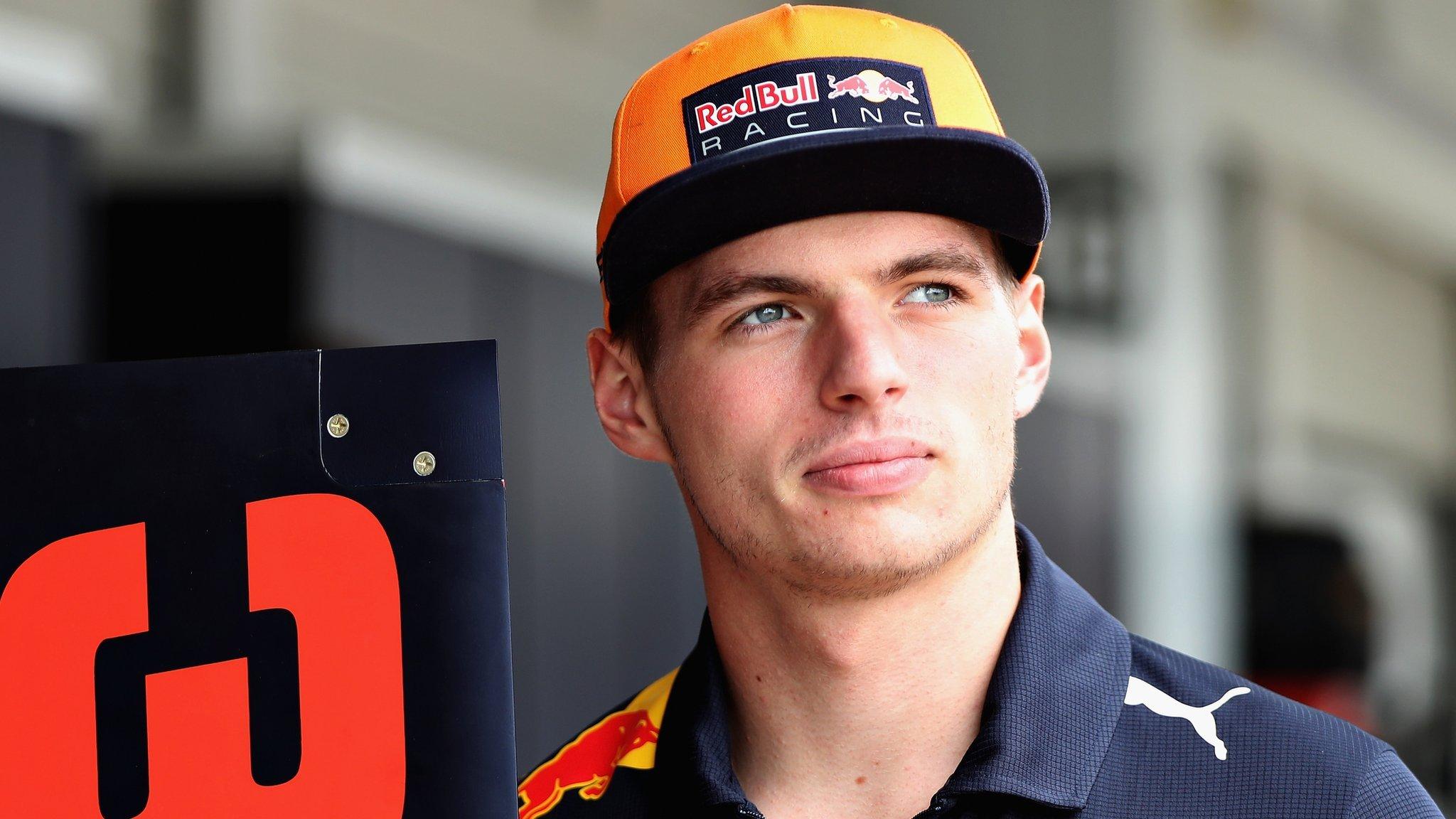Formula 1: Max Verstappen's maturity is earning him millions
- Published
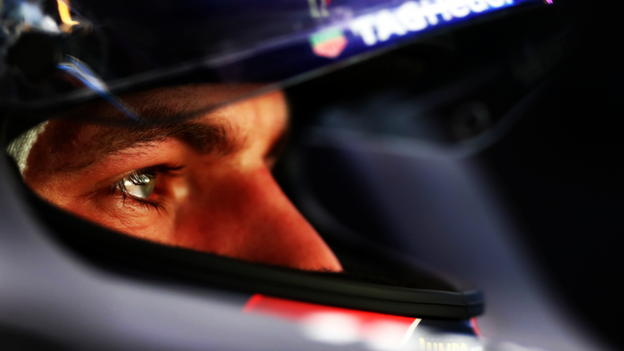
Max Verstappen's new Red Bull contract is said by those in the know to make him the third best paid driver in Formula 1 behind Lewis Hamilton and Sebastian Vettel from next year.
The team will not reveal the exact amount but, by process of elimination, the Dutchman's salary for the next three years will be between £18-26m. Not bad for a 20-year-old who will be starting only his fourth full season in F1.
But the thing is, Verstappen is worth it.
Where exactly he stands in the hierarchy of best drivers in the sport is a matter for debate. But it's impossible to argue after this season that he is not in the discussion with Hamilton, Vettel, his Red Bull team-mate Daniel Ricciardo and McLaren's Fernando Alonso.
Red Bull have clearly come to the same conclusion. Verstappen's contract already ran to 2019. But when they believed Mercedes were sniffing around in the late summer, the team moved quickly to lock him down for another year.
It's easy to see why Red Bull were so determined to keep hold of Verstappen. In his first full season with the team, he has built on the outstanding impression he had already made in 2016, when he was promoted from junior team Toro Rosso after four races to replace Daniil Kvyat.
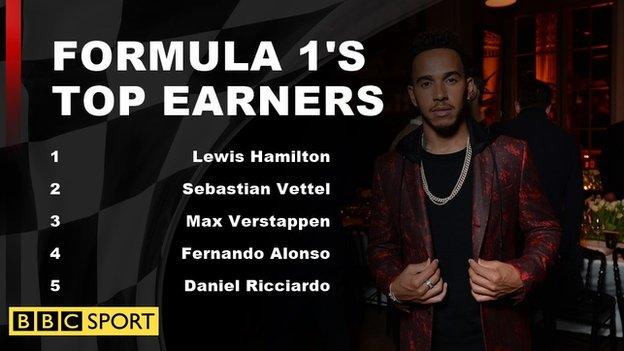
Last year, there were some outstanding drives - especially in the wet in Brazil, when Verstappen drove so well that he earned comparison with the best performances of Ayrton Senna - but on balance Ricciardo shaded him, especially in qualifying.
Not so in 2017. Verstappen out-qualified the Australian 13 times in 20 races and won two grands prix to the Australian's one.
This is not to denigrate Ricciardo. He flat beat Vettel when they were team-mates at Red Bull in 2014, is a world-class driver himself, and finished ahead of Verstappen in the championship.
As Red Bull team principal Christian Horner puts it: "We know Daniel is an unbelievable qualifier so it shows the level Max is operating at."
Ricciardo is the first to acknowledge how much his team-mate has stepped forward this year.
"Max improved this year compared to last year. The qualifying shows that," Ricciardo says. "His Saturdays were certainly good. Our Sundays - OK he has had two wins and I've had one, but generally my Sundays have been good, the racing and the race-craft.
"But the Saturdays I wouldn't say I was happy with myself always and he also improved. It was a good year for both Lewis and Max."
How has Verstappen improved?
While Ricciardo is all smiles and jokes, possibly the funniest and genuinely light F1 driver there has ever been, Verstappen is a matter-of-fact kind of guy. He doesn't say a lot, and what he does say tends to be straightforward and direct.
As such, his explanation for why he has stepped up his game in 2017 is predictably lacking in flourish.
"Of course qualifying has been a big improvement but already last year the last few races I was on good form with that," he says.
"It was just general experience and putting the pieces together and a bit of luck as well, because qualifying is a bit like that.
"It has been in my favour and I am enjoying qualifying more and I have grown as a driver and that helps a lot in those circumstances. In the race; I was never too worried about that. That was always going quite well but if you are in a good starting position that helps a lot."
Verstappen says his improvement in qualifying is a combination of experience, being with the team over a winter to prepare the season better, and the faster, more demanding 2017 cars.
"Just little things," the Dutchman says. "Feeling a bit more confident with the car because now I had a full season with it instead of just jumping in, so it's not fully like you want it.
"Winter testing is very important for that. And I like this kind of car a bit more. You can be bit more aggressive and throw the car into the corner and that's what I like anyway. Last year was very tricky and sensitive to front (brake) locking and stuff, and this year it has been a lot better for me.
"It's more like a race car. Last year's was a bit more like a toy car in feeling. This year it is more rough and it's harder to drive. In general it's also just more enjoyable because you can go a lot faster into the corners and I think that helped me."
Formula 1: Up close and personal with Max Verstappen
What makes Verstappen so special?
It has been an exceptional season from Verstappen, with a series of outstanding performances.
Most obviously, his two wins in Malaysia and Mexico were utterly dominant drives. He passed Hamilton's Mercedes on his way to winning at Sepang, and in Mexico City out-foxed Hamilton and Vettel to take the lead at the first corner and proceeded to drive off into the distance.
Admittedly, Vettel, arguably the fastest man both weekends, was out of the picture in both races. The German started from the back in Malaysia, where he almost certainly would have won, and damaged his front wing on Hamilton's car in Mexico, where he would have been expected to challenge Verstappen closely. But that should take nothing away from the quality of the two drives.
Verstappen might well have won in Singapore, too, had not he been taken out in the multi-car pile-up at the start, precipitated by Vettel over-reacting to the Red Bull driver's better getaway.
He also produced outstanding recovery drives in the USA and China - making up ludicrous numbers of places in the early laps in both races, including rising from 16th to seventh on the first lap alone in China - and was stunning in chasing Hamilton all the way in Japan.
Horner has been particularly impressed by the way Verstappen has handled the poor reliability of engine partner Renault, which cost him several strong finishes, including a second place in Canada and possibly a win in Azerbaijan, where Ricciardo ultimately triumphed.
"Max has had the benefit of experience and he has just grown in experience of racing in general," Horner says. "Don't forget, it is only his fourth year of car racing. And what has really impressed me this year is the way that he has dealt with some of the difficult moments.
"There have been quite a few of those, particularly in the summer months. But he has kept working hard at it, he has kept the hours up on the simulator every week and his application is first class. And obviously his ability is unquestionable."
What makes him so special?
"He has a great feel for the car, a great sensitivity to the limit of the car," Horner says. "He is a risk taker - not irresponsible risk, but calculated risk - and he has a fighting spirit which is exciting to watch."
Growing up out of the car, too
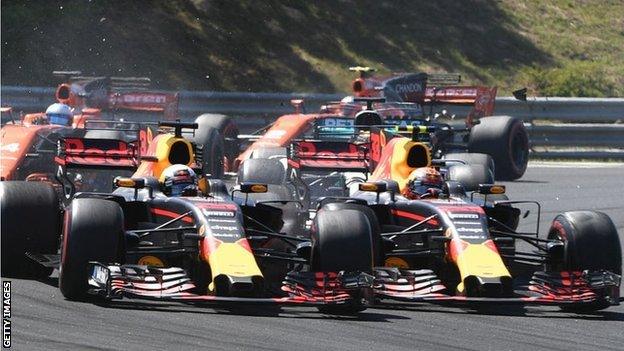
Verstappen said of the collision with Ricciardo in Hungary: "It is never my intention to hit anyone but especially not your team-mate"
Not only has Verstappen apparently stepped up a level in overall performance, he has rounded off a lot of the rough edges that were visible in 2016 and become a more complete performer.
Last year, controversy over his defensive driving tactics followed Verstappen around, to the extent that a rule was effectively created to try to outlaw what other drivers saw as one particularly dangerous manoeuvre that he had effectively trademarked.
This year, bar a controversial collision with Ricciardo at the Hungarian Grand Prix, Verstappen has generally escaped criticism. The only other exception was his off-track overtaking move on Kimi Raikkonen's Ferrari in Austin.
Verstappen's response to being penalised for that move - making derogatory and highly personal criticisms of one of the stewards - showed he still has some way to go in the maturity stakes.
But his reaction following the incident with Ricciardo in Hungary suggested he is heading in the right direction.
Ricciardo was furious that Verstappen's over-optimistic move on the first lap led to his retirement. Was this the moment the explosion in the relationship many had expected would come? Verstappen defused it.
"It was very important for our relationship and also for the health of the team that that got squashed then and there," Ricciardo says, "and the only way in my mind for that to happen; it wasn't me going up and grabbing him by the collar, even though I wanted to. He needed to come to me and apologise, I guess, like a man, as we say. And he did.
"I didn't need to chase him, I didn't need to ask for an apology. He found me and we talked away from cameras, team principals and all that. It was what I needed to hear. I wanted him to admit it was his mistake.
"If he made an excuse and said I turned in on him or something, the problem would have kept going on. So that was good. Handled well. I was able to move on after that. Still frustrated but I couldn't ask for anything more. People make mistakes and at least he addressed it the right way."
For now, the two are genuinely warm towards each other on the surface, even if a certain guardedness is apparent.
Ask Verstappen how his relationship with Ricciardo is, and he jokes: "Really bad. He keeps farting. It smells so bad in the hospitality all the time.
"No, he's a great guy. Of course, on track you always try to beat each other but off-track we can have a great laugh. We really respect each other and, to be honest, I've never really experienced something like that in racing, to have such a good team-mate, to really have fun with. I hope we can be team-mates for a long time."
Can it stay that way?
"I think so because we respect each other," Verstappen says. "For sure, when you fight for the world championship it will get a bit more tense on the track. But at the end of the day you always come back to where you respect each other and you have to accept if one guy is faster than the other and I think that's what we can do.
"When somebody has a good race, we can really say to each other 'well done' and 'you really deserved that'. That's also very important."
Ricciardo, eight years older, is a little more circumspect: "It would be nice to keep him on my birthday list. We said at the start of the year it would be a good problem to have. We will see."
Digging down into Verstappen v Ricciardo
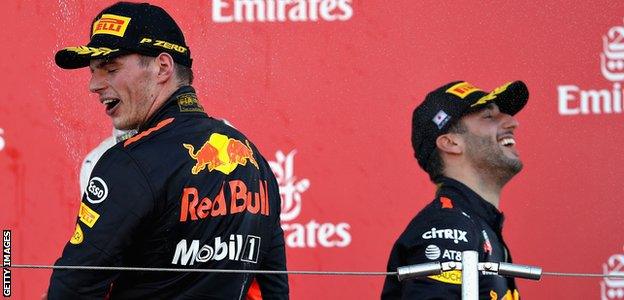
Can Red Bull challenge for the title next season?
The respect - and under-the-surface wariness - between the two almost certainly arises from the fact that, fundamentally, they are very evenly matched.
In terms of race results, there was not much to separate them this year. Verstappen had two wins to Ricciardo's one. But Ricciardo had eight other podiums, Verstappen only two, and Verstappen retired seven times and Ricciardo six. The Australian ended up 32 points ahead in the championship.
And although the qualifying record appears skewed in Verstappen's favour, drill down a bit and it is actually incredibly close on pure pace.
Verstappen has an edge - but by an average of only 0.03 seconds over 20 races, one of the closest battles between team-mates on the grid. It's just 0.015secs if you take out Baku, where Ricciardo crashed in final qualifying and did not set a time.
That is why many people believe Red Bull have the strongest driver pairing on the grid, and why if the team and Renault can improve enough to challenge Mercedes and Ferrari week-in, week-out, they will be a formidable force.
"I believe next year we will close the gap," Ricciardo says. "Is it enough to fight for the title? I think we will certainly get close.
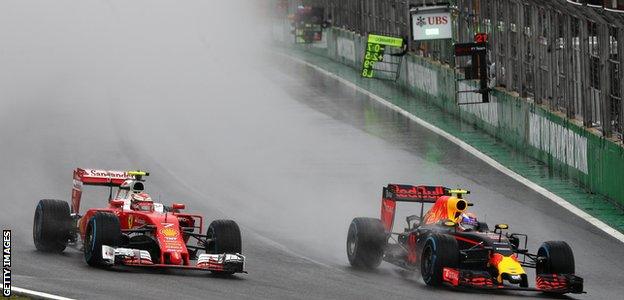
Coming of age: Verstappen survived spins, overtook both Ferraris and gained 10 places in the closing laps of the Brazilian Grand Prix in 2016
"Max improved this year from last year. I won't say he came a long way, because he was always there.
"For me, there have been moments of great but I would love every moment to be great. It hasn't always been great.
"I always want more out of myself. There are things I learnt this year. I felt it took me too long to learn it, if I am being critical of myself.
"But happy I did learn in the end and I'm still learning, still getting better and ready to put it all together for 2018 and ready to make the most of a winning car. Next year it is going to be a lot of fun and I am looking forward to that."
Verstappen says: "It depends what I have around me. I believe in the team, but we don't know what other teams are doing so we have to wait and see."
Verstappen is not prone to public introspection. It's the unshakeable self-confidence of a young man with a very rare talent who has had a rocket-ship ride to the top.
- Published1 October 2017
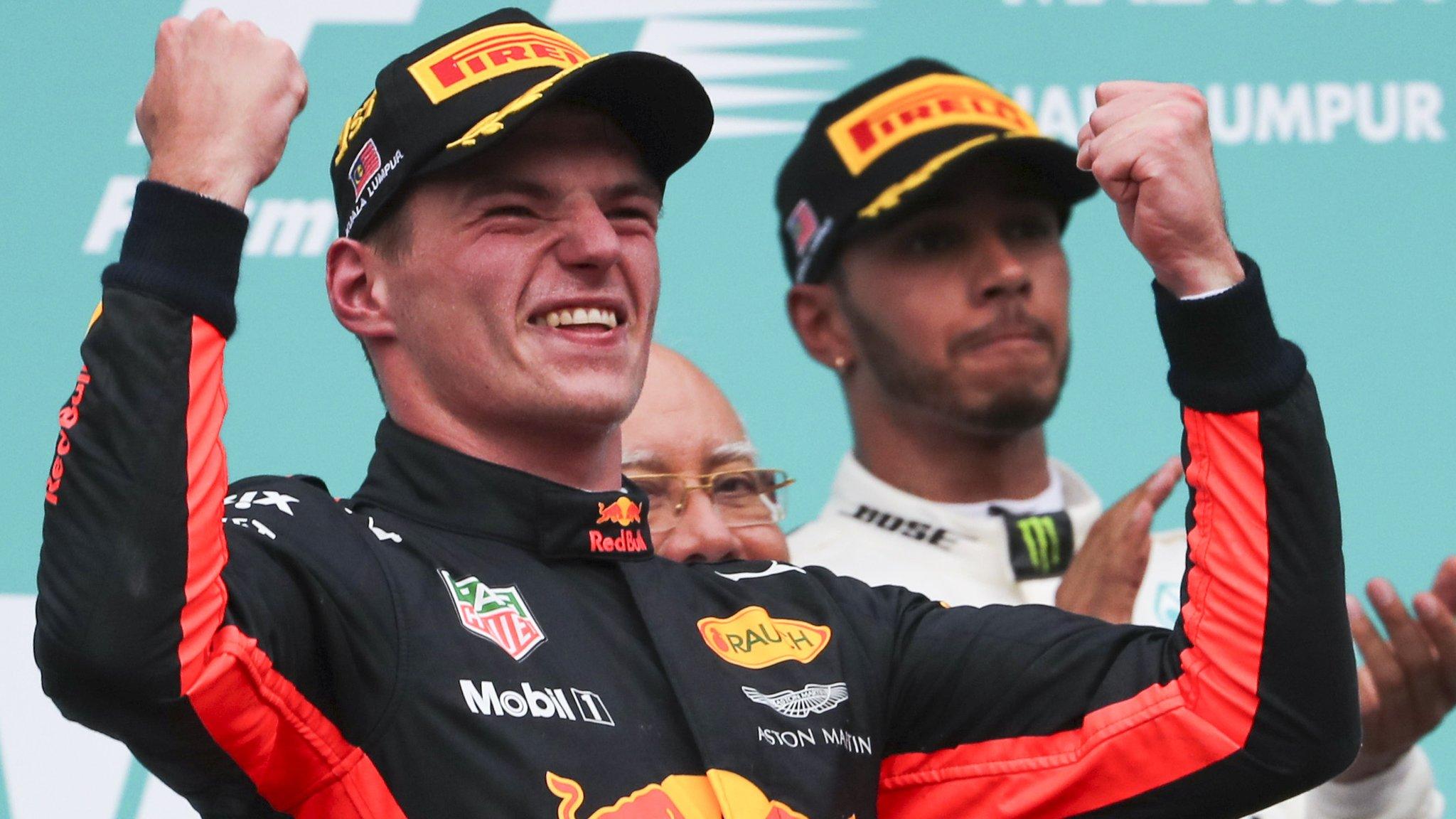
- Published20 October 2017
